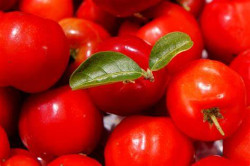Acerola - Warfarin Interaction
Herbal: Acerola
Also Known As: Malpighia emarginata, Acerola Cherry, Barbados Cherry, Cereso, Cereza, Cerisier, Chereese, Grosella, Puerto Rican Cherry, Semeruco, West Indian Cherry, West Indies Cherry
Drug: Warfarin
Brand names:
Warfarin

Medical Content Editor Dr. Brian Staiger, PharmD
Last updated
May 25, 2025
Interaction Details
Warfarin is classified as belonging to the following category: Warfarin (Coumadin)
Theoretically, acerola might reduce the effectiveness of warfarin; however, its vitamin C content is likely too low to produce clinically significant effects.
Acerola contains vitamin C. High doses of vitamin C may reduce the response to warfarin, possibly by causing diarrhea and reducing warfarin absorption. This occurred in two people who took up to 16 grams daily of vitamin C, and resulted in decreased prothrombin time. Lower doses of 5-10 grams daily of vitamin C can also reduce warfarin absorption, but this does not seem to be clinically significant. The vitamin C content of acerola is typically about 2000 mg per 100 grams. Thus, a clinically significant interaction between acerola and warfarin is unlikely.
Interaction Rating
Likelihood of Occurrence
UnlikelyInteraction has been demonstrated in animal or in lab research but has been shown not to occur in humans.
References
- Rosenthal G. Interaction of ascorbic acid and warfarin. JAMA 1971;215:1671.
- Hume R, Johnstone JM, Weyers E. Interaction of ascorbic acid and warfarin. JAMA 1972;219:1479.
- Smith EC, Skalski RJ, Johnson GC, Rossi GV. Interaction of ascorbic acid and warfarin. JAMA 1972;221:1166.
- Feetam CL, Leach RH, Meynell MJ. Lack of a clinically important interaction between warfarin and ascorbic acid. Toxicol Appl Pharmacol 1975;31:544-7.
- Weintraub M, Griner PF. Warfarin and ascorbic acid: lack of evidence for a drug interaction. Toxicol Appl Pharmacol 1974;28:53-6.
Acerola Overview
 Acerola, also known as the Barbados cherry or West Indian cherry, is a small, red fruit that is native to Central and South America. The fruit is known for its high levels of vitamin C, which is a powerful antioxidant that can help to protect cells from damage caused by free radicals.
Acerola is commonly used as a supplement to increase vitamin C intake and it is available in various forms such as capsules, tablets, and powders. It is also often found in juice, jams, and other food products.
Acerola, also known as the Barbados cherry or West Indian cherry, is a small, red fruit that is native to Central and South America. The fruit is known for its high levels of vitamin C, which is a powerful antioxidant that can help to protect cells from damage caused by free radicals.
Acerola is commonly used as a supplement to increase vitamin C intake and it is available in various forms such as capsules, tablets, and powders. It is also often found in juice, jams, and other food products.
Warfarin Overview
-
Warfarin is used to prevent blood clots from forming or growing larger in your blood and blood vessels. It is prescribed for people with certain types of irregular heartbeat, people with prosthetic (replacement or mechanical) heart valves, and people who have suffered a heart attack. Warfarin is also used to treat or prevent venous thrombosis (swelling and blood clot in a vein) and pulmonary embolism (a blood clot in the lung). Warfarin is in a class of medications called anticoagulants ('blood thinners'). It works by decreasing the clotting ability of the blood.
Acerola - More Interactions
Acerola interacts with 128 drugs
Interaction Rating Key
These severity listings are for informational use only. Never start, stop or otherwise change your therapy before speaking with your provider.
| Major | The combined use of these agents is strongly discouraged as serious side effects or other negative outcomes could occur. |
| Moderate | Use cautiously under the care of a healthcare professional or avoid this combination. A significant interaction or negative outcome could occur. |
| Minor | Be aware that there is a chance of an interaction. Watch for warning signs of a potential interaction. |
| Unknown | No interactions have been reported or no interaction data is currently available. |
Return to the main supplement interaction checker page
Parts of this content are provided by the Therapeutic Research Center, LLC.
DISCLAIMER: Currently this does not check for drug-drug interactions. This is not an all-inclusive comprehensive list of potential interactions and is for informational purposes only. Not all interactions are known or well-reported in the scientific literature, and new interactions are continually being reported. Input is needed from a qualified healthcare provider including a pharmacist before starting any therapy. Application of clinical judgment is necessary.
© 2021 Therapeutic Research Center, LLC
Drug descriptions are provided by MedlinePlus.
